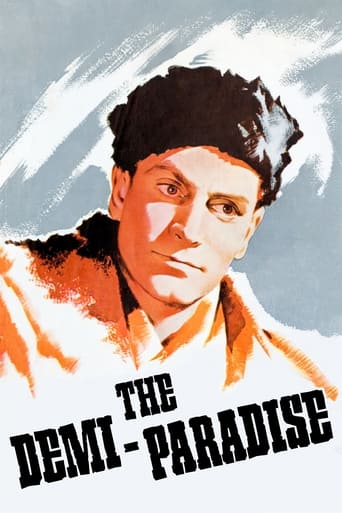robertguttman
One has to keep in mind that this British comedy, about the experiences of a Soviet engineer in Britain, was produced at a critical point in the relations between those two nations. Due to the fact that Joseph Stalin had signed a non-aggression pact with Adolf Hitler, the Soviet Union remained neutral after Britain and France went to war against Germany in 1939. The Soviets didn't come into the war as an ally of Britain until the middle of 1941, after Germany invaded Russia. It was not an easiest alliances. Unlike the case of Britain and the United States, Britain and the Soviet Union had almost nothing in common, either politically or linguistically. In fact, British relations with the Soviet Union had been strained ever since the 1917 Revolution.The Demi-Paradise was produced as an aid to bridging the cultural gap between those two allies, at least from the British point of view. I have no idea whether it was ever shown in Russia, let alone how it would have been perceived by audiences there. The story concerns a Russian engineer, played by Olivier, who encounters a pair of British seamen ashore in Murmansk during World War II. Typically, the British are complaining about the difficulties they are having among the "foreigners". To their astonishment, Olivier jokingly informs them in English that it is they who are the "foreigners" in Russia, and then proceeds to recount his own experiences as a "foreigner" when he was assigned to do a job in Britain both before, and during, the war. In addition to being a wartime propaganda film, The Demi-Paradise is full of the sort of self-deprecating humor the British seem to love. While produced in Britain, the script actually was written by a Russian ex-patriot, Anatole de Grunwald. Consequently, one cannot help but feel that the writer brought a lot of his own personal experiences and impressions into the story. The result is very droll, and one cannot help but feel that the protagonist's experiences are probably universal to any stranger in a strange land.
cherimerritt
Young Russian inventor Ivan Kouznetsoff (Sir Lawrence Olivier) brings his new design and prototype for an underwater ice-breaker propeller to pre-war England (1938-39) in hopes of presenting it to world famous engineer and shipbuilder, Mr. Runalow (Felix Aylmer), hopefully for production. He coincidentally meets Mr. Runalow's granddaughter, Ann (Penelope Dudley-Ward), who takes him under her wing and home to the family. Culture shock (in both directions) permeates his every experience and interaction. The development of mutual understanding is the sub-plot, hastened by Hitler's invasion of Russia during Kouznetsoff's second trip to England and its subsequent synergy of combined effort to assist Russia and to complete the ship with the cutting edge propeller.Having worked for 2+ years with émigrés from Russia who lived through WWII and were contemporaries with this film, Olivier's interpretation of Russian sensibility was of great interest to me and he did a very fine job. One of Olivier's best performances, in this writer's opinion. Well written script and dialog. Performances of Felix Aylmer and Penelope Dudley-Ward were quite enjoyable. Felix Aylmer as a wise genius in this film bears notice in contrast to his role as Polonius in Olivier's Hamlet. The film held my undivided attention the entire two hours.Highly recommended for anyone with high interest in inter-cultural relations. Given human nature's propensity for alienating others who display any differences, the making of this film was a stroke of genius. Hopefully it was widely viewed at that time (1943) and provoked reflection. If a picture is worth 1000 words, a moving picture is worth 1000 pictures. Kouznetsoff's speech at the ship's christening and launch is priceless - remarkably apt and inspiring.
MartinHafer
During WWII, the American and British film industry made quite a few films that attempted to rehabilitate the perceptions about the Russian people. That's because before the war, they were the enemy, but now that the three countries were allies, the government pushed film makers to portray the Russians in very glowing terms. In the States, films like THE NORTH STAR gave a sickeningly sweet view of the Russians that were just too good to be true. THE DEMI-PARADISE is a British film that also seeks to made the Russians seem more human--more like our friends.It's interesting to see the famous actor Laurence Olivier playing Ivan Kouznetsoff--a Russian who talks to some British seamen during the war about his visit to London before the war. His accent seemed okay to me, but who am I to judge?! Anyways, the film is all told in flashback form. For the most part, Olivier's character is a bit standoffish and seems to think everything Russian is better--though this improves a bit through the course of the film. As for the Brits, they range from a few suspicious idiots to those who keep pointing out how "they are just like us". A father even wonders out loud about what a great husband Kouznetsoff would make. Talk about over-idealizing the Russians. As a result, the people in the film seem more like caricatures than real people. And as for Olivier, he seemed a bit silly--very stereotypical and broad in his portrayal.Now despite me not loving this film and disliking how unreal everyone seemed, it was a good bit better than the WWII Hollywood films that were pro-Russia. They went even further to idealize Russia--to such a point that the films are downright dumb, as no group of people is THAT wonderful and happy and full of spunk! Overall, it's an interesting curio but certainly not a film you should run out to rent.
vasa
Good example of the type of movies made in England during the war, to keep spirits up. The Brits never seem to engage in gung-ho war stuff: which makes for more pleasant viewing.While nowhere near the league of, say, "A Canterbury Tale", The Demi-Paradise has enough realism (of the British character) to while away a pleasant hour and a half.


